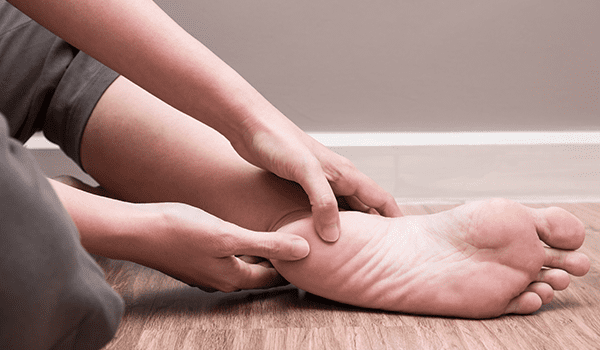Heel pain is a prevalent foot condition that can disrupt the daily lives of adults. It typically arises due to stress on the structures linked to the calcaneus, the largest bone in the foot. Since the heel plays a crucial role in weight-bearing during walking, it is vulnerable to various conditions. The plantar fascia and the Flexor digitorum brevis muscle, situated on the sole of the foot, are closely associated with heel pain. Abnormal gait patterns can lead to inflammation of these structures, resulting in discomfort.

Understanding the Causes of Heel Pain
To effectively treat heel pain, it is important to understand its causes. Here are some common causes:
- Plantar Fasciitis: The most common cause of heel pain, plantar fasciitis occurs when the plantar fascia, a thick band of tissue running across the bottom of the foot, becomes inflamed or damaged. This inflammation often results from repetitive strain or excessive pressure on the foot’s arch.
- Achilles Tendonitis: This condition is characterised by inflammation of the Achilles tendon, which connects the calf muscles to the heel bone. It is often caused by overuse, particularly in runners and athletes.
- Heel Spurs: Heel spurs are bony growths that develop on the heel bone, often as a result of long-term plantar fasciitis. While heel spurs themselves are not always painful, they can exacerbate discomfort when walking or standing.
- Bursitis: Bursitis involves inflammation of the bursae, small fluid-filled sacs that cushion the joints. Bursitis can cause a tender, bruise-like sensation in the heel, especially after prolonged standing or walking.
- Stress fractures: Are tiny breaks in the bone that can be extremely painful. Overuse or repetitive motion frequently leads to stress fractures in the heel.
Heel discomfort is more common in certain demographics, including elderly folks, athletes, overweight people, and persons who spend a lot of time on their feet as a result of their employment or lifestyle.
Symptoms and Diagnosis
Heel pain symptoms can change based on the underlying cause. The heel’s soreness, stiffness, and pain are typical signs. In some cases, the pain may be worse in the morning or after periods of rest.
Physical exam and assessment of medical history are frequently used to diagnose heel pain. In order to check for bone fractures or other abnormalities, your healthcare professional may also order imaging tests like X-rays.
Treatment Options
At Perfect Balance Clinic, we offer a range of treatment options tailored to the specific cause of your heel pain. These include:
- Orthotics: Custom-fitted orthotics, or padded shoe inserts, can provide significant relief from heel pain. Our expertise in orthotics ensures a perfect, comfortable fit for daily wear. These devices are designed to distribute pressure evenly across your foot, reducing strain on the heel and alleviating pain.
- Shockwave Therapy: This revolutionary therapy involves a series of low-energy pulses mechanically applied to the pain site for a few minutes. Shockwave Therapy is a painless and highly effective treatment for various types of pain. Administered by our experienced practitioners using a handheld device, this treatment requires only a few sessions over a set period.
Prevention and Complications
Prevention is equally important in managing heel pain. Regular stretching exercises, wearing properly fitted shoes, and avoiding overuse can help prevent heel pain. If you’re a runner, consider running on softer surfaces and reducing your mileage to prevent injuries.
Chronic pain that interferes with daily activities, changes in gait that cause problems with other body parts like your foot, knee, hip, or back, and potential disability if the pain is severe enough to keep you from walking are all complications of untreated heel pain.
Seeking Professional Help
Persistent heel pain should not be ignored. It’s time to get expert assistance if your heel pain doesn’t go away after a few weeks of rest and at-home care, or if it makes it difficult to walk. Our goal at Perfect Balance Clinic is to assist you in controlling your symptoms and avoiding further crises. Don’t let heel pain hold you back – get in touch with us today for a proper diagnosis and treatment plan.
If this article resonates with you then…
This article was written by our team of specialist therapists at Perfect Balance Clinic. If you would like more specific advice about how our team can help you with this condition or symptoms you may be having, please complete the contact form below and one of the team will get back to you shortly.







